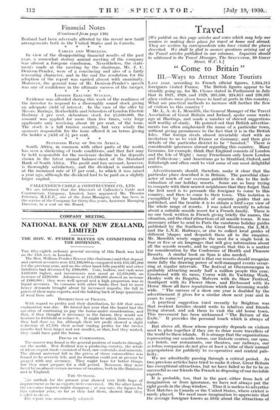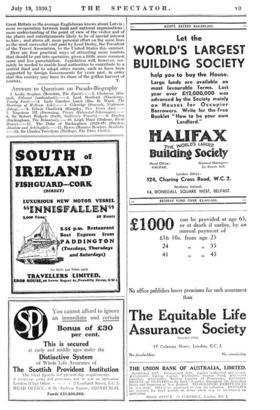Travel
We publish on this page articles and notes which may help our readers in making their plans for travel at home and abroad. They are written by correspondents who have visited the places described. We shall be glad to answer questions arising out of the Travel articles published in our columns. Inquiries should be addressed to the Travel Manager, The SPECTATOR, 99 Gower Street, W.C. 1.]
" Come to Britain "
III.—Ways to Attract More Tourists LAST year, according to French official figures, 1,934,515 foreigners visited France. The British figures appear to be steadily going up, for Mr. Clynes stated in Parliament in July that in 1927, 1928, and 1929, 205,348, 224,815 and 238,391 alien visitors were given leave to land at ports in this country. What are practical methods to increase still further the flow of visitors to this country ? Mr. L. A. de L. Meredith, the General Manager of the Travel Association of Great Britain and Ireland, spoke some weeks ago at Hastings, and made a number of shrewd suggestions well worthy of study. He pointed out that British advertise- ments too often emphasized the name of a particular town, without giving prominence to the fact that it is in the British Isles. Our foreign rivals almost invariably start with an invitation to us to visit France or Germany, and then give details of the particular district to be " boosted." There is considerable ignorance abroad regarding this country. Many Germans, for example, think that England consists of London and the Isle of Wight ; many Frenchmen only know London and Folkestone ; and Americans go to Stratford, Oxford, and Edinburgh and often omit to visit some of our most delightful centres.
Advertisements should, therefore, make it clear that the particular place described -is in Britain. The parochial char- acter of much of our overseas publicity is due to the indi- vidualism of our holiday resorts. Some are so busy trying to compete with their nearest neighbours that they forget that the first need is to persuade the foreigner to come to this country, and then to come to their town. This isolation is exemplified by the hundreds of separate guides that are published, and the trouble it is to obtain a bird's-eye view of the whole range of resorts. I was asked recently to advise about a suitable seaside resort for a French family. There is no one book written in French giving briefly the names, the situation, and the chief attractions of all seaside towns. It was necessary either to send to Paris the cumbrous holiday guides published by the Southern, the Great Western, the L.M.S. and the L.N.E. Railways', or else to collect local guides Of different !shapes and despatch them all to the enquirer. Mr. Meredith wisely suggests the need for a single book in four or five or six languages that will give information about all the seaside resorts, and he suggests that this is a matter for consideration by the Conference of Health and Pleasure Resorts. A similar book on Spas is also needed.
Another shrewd proposal is that our resorts should recognize more fully the drawing power of well-managed-events occur- ring at regular intervals. The festival at Oberammergau is probably attracting nearly half a million people this year. Goodwood with its races, Cowes with its Yachting Week, Henley with its Regatta, Malvern with its Shaw Festival, Southport with its Flower ShOw, and Richmond with its Horse Show all have reputations which arc becoming world- wide. " The success of a show one year is doubled by the advertisement it gives for a similar show next year and in years to come."
A practical suggestion tried recently by Brighton was that resident families should write to relatives and friends living abroad, and ask them to visit the old home town. This movement has been nicknamed " The Return of the Exile." It provides the personal touch which is always of value.
But above all, those whose prosperity depends on visitors need to plan together if they are to draw more travellers of the world to these islands. It is strange that the organizations representing our seaside towns, our historic centres, our spas, air hotels, our restaurants, our theatres, our railways, our tobus companies do not give at least a tithe of their annual
appropriation for publicity to co-operative and central We are admittedly passing through a critical period. As
two previous articles have tried to make it clear, Great Britain has exceptional attractions, but we have failed so far to be as successful as our friends the French in disposing of our invisible exports.
It is probable, too, that in the past, either from lack of imagination or from ignorance, we have not always put the right goods in the shop window. Thus it is useless to advertise Test Matches in Canada or the United States, where cricket is rarely played. We need more imagination to appreciate that the average foreigner knows as little about the attractions of Great Britain as the average Englishman knows about Latvia ; more co-operation between local and national organizations ; more understanding of the point of view of the visitor and of the places and entertainments likely to be of special interest to him ; and above all, more personal effort on the same lines as the most successful visit paid by Lord Derby, the President of the Travel Association, to the United States this summer.
Here are four practical ways of attracting more tourists that should be put into operation, given a little more common sense and less parochialism. Legislation will, however, cer- tainly be needed to enable local authorities to contribute to a central fund and to adopt other means, such as have been supported by foreign Governments for years past, in order that this country may have its share of the golden harvest of

















































 Previous page
Previous page